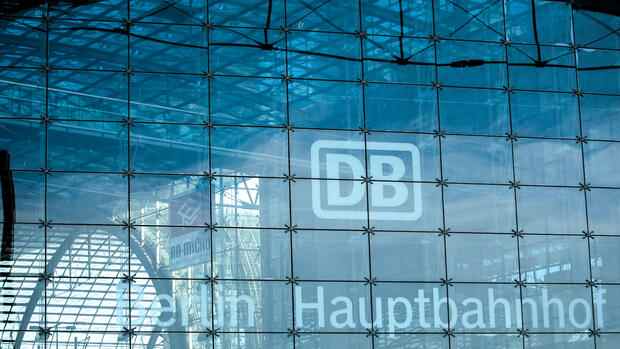Berlin Traffic on the rails in northern Germany was paralyzed for several hours. The reason was a possible act of sabotage. Unknown persons had destroyed important communication cables. Now the police are looking for the perpetrators.
Not much is known about the background. Several government politicians spoke of an act of sabotage on Saturday. The most important questions and answers.
“We have a crime scene in Berlin-Hohenschönhausen,” said a spokesman for the Berlin Federal Police Directorate of the German Press Agency. “Another is in North Rhine-Westphalia.” From security circles it was said that so-called fiber optic cables were deliberately damaged at the Karower Kreuz in Berlin and in Herne in North Rhine-Westphalia. The backup system also failed.
The destroyed cable disrupted the digital train radio GSM-R (Global System for Mobile Communications – Rail), according to a spokeswoman for Deutsche Bahn. “It is used for communication between the control centers that control the train traffic and the trains and is therefore an indispensable component for smooth train traffic.”
Top jobs of the day
Find the best jobs now and
be notified by email.
“Currently, a targeted external influence on the cable of the Deutsche Bahn can be assumed,” said the spokeswoman. For reasons of investigation tactics, he could not provide any information on further details.
What are the effects of the disruption on rail traffic?
The sabotage affected long-distance and, to some extent, regional Deutsche Bahn services in large parts of northern Germany. Countless passengers were stranded at the major train stations such as Hanover, Hamburg and Berlin. Long queues formed at information desks.
International connections were also affected. So no IC trains ran between Berlin and Amsterdam. IC trains from Copenhagen terminated at the Danish-German border in Padborg. There was also a standstill in some regional trains – such as RE and RB connections in Lower Saxony, Bremen and Schleswig-Holstein, as the railway announced.
In the course of Saturday morning, the railway reported that the disruption had been resolved, but that there could still be impairments. “Unfortunately, you still have to expect train and stop cancellations and delays,” tweeted the railway. In general, Deutsche Bahn recommends that its travelers inform themselves shortly before their planned journey via www.bahn.de/reiseauskunft, via the “DB Navigator” app or by calling 030/2970.
Who investigates?
The investigations are being conducted in all directions, the federal police said on Saturday. On Saturday evening, the investigations were handed over to the State Criminal Police Office in Berlin, as spokesman for the federal police and the Berlin situation center confirmed early Sunday morning.
What are the reactions from politicians?
Federal Transport Minister Volker Wissing (FDP) made it clear: “Cables that are essential for train traffic were willfully and deliberately severed.” The train had become the target of an attack.
Green leader Omid Nouripour called for improvements in the protection of critical infrastructure in view of the fact. “Today’s attack on the cable connections of the railways has caused chaos at the stations, delays in the supply chains and massive uncertainty among the population,” said Nouripour. The critical infrastructures and thus all of us are vulnerable.
(1/2) The backgrounds of the #Sabotage in the @DB_Bahn are not yet known. But anyone who systematically attacks our country’s critical infrastructure will receive a resolute response from our democracy. We won’t be intimidated.
— Omid Nouripour (@nouripour) October 8, 2022
Others, such as Bundestag member Sven Lehmann (Greens), accused the CDU of insufficient investment in the security of critical infrastructure with regard to the act of sabotage.
Friedrich Merz and the Union are a security risk.
The traffic light coalition wanted the 100 billion Special funds also apply to cyber security & civil protection. CDUCSU prevented that out of party calculations.
Today we see how wrong that was!#CRITIS #Sabotage
— Sven Lehmann (@svenlehmann) October 8, 2022
The traffic light government also wanted to use the EUR 100 billion special fund for the Bundeswehr announced in spring for cyber protection and civil security. However, the Union prevented this for political reasons, according to Lehmann.
The SPD faction deputy and transport politician Detlef Müller called for a concept for better protection of the railway infrastructure from Transport Minister Wissing and the security authorities. The critical infrastructure includes not only rails and trains, but also digital control and safety technology, said Müller to the editorial network Germany. The technology must be “installed in an access-safe manner” when new construction and the renovation of routes are made.
The parliamentary manager of the CDU/CSU parliamentary group, Thorsten Frei, called for waiting for the results of the police investigation. “Regardless of this case, we have to rethink the security architecture of Germany and the EU,” Frei told the editorial network Germany. “The new age of hybrid warfare requires an adjustment of our concepts.”
More: “The threat is growing” – How endangered is the critical infrastructure in Germany
